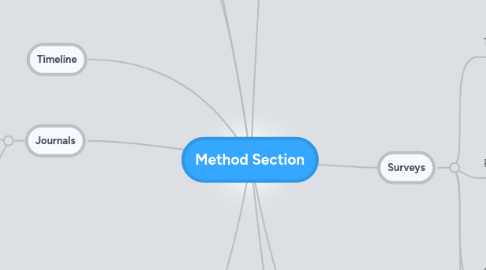
1. Journals
1.1. Purpose of the journals
1.2. What will be kept
2. Observations
2.1. Types of observations
2.1.1. Journal and Video - Whole Class
2.1.1.1. The purpose here is to analyze how well the problem solving conversations are progressing. They will also be used by the brainstorming focus groups when looking at imporvments to make in the class room.
2.1.1.2. My goal is to video the whole group once every other week.
2.1.1.3. My goal is to keep an adhoc journal with at least one reflection every other day.
2.1.2. Journals Video - Focus Group
2.1.2.1. I will videotape my small focus group students to compile evidence about their mathematics habits and attitudes.
2.1.2.2. My goal is to video tape each group member twice during the research period.
2.1.2.3. My goal for the journals is to keep an adhoc journal of the focus group but to have at least one observation per week per focus student.
3. Timeline
4. Work samples
4.1. Type of work to be collected
4.1.1. Problem journals
4.1.2. Photos of presented work
4.1.3. Skills assessments
4.2. Purpose of collecting work samples
4.2.1. To assess base line and progress of problem solving ability
4.3. Whose work
4.3.1. Foucus Group
5. Creative Assessment
5.1. Videoing a group wokirng on a problem - assess based on ability to collaborte successfuly
5.2. One on one role play with tacher or another tsutedent
5.2.1. Students assume roles of student in a problem solving scenario
6. Overview
6.1. Research Question
6.1.1. How can I use problem based mathematics to differentiate in untracked eigth grade mathematics classroom.
6.2. Research Methods
6.2.1. Surveys, interviews, focus groups, journals, work samples, and observations.
6.3. Who will be studied
6.3.1. My class of 56 8th graders
6.3.1.1. Not focusing on a single class because I often mix between classes.
6.3.2. A smaller representative focus group
6.3.2.1. 3 boys 3 girls
6.3.2.1.1. IEP or ELL
6.3.2.1.2. traditionally unchallenged student
6.3.2.1.3. traditionally challenged student
6.3.3. Critical Friends
6.3.3.1. Looking at how using a critical friend can help during the problem solving process.
6.4. What will be measured or observed
6.4.1. Attiudes towards mathematics.
6.4.2. Ability to problem solve - to identify an apply habits of problem solving
6.4.3. Opinions about what mathematics is and what math students do.
6.4.4. Attitudes about ones own mathematics abilities
6.4.5. Suggestions and approaches that students have for increasing the effectiveness of the class. Differentiation, problem construction, knowledge construction, etc.
7. Surveys
7.1. Types of surveys
7.1.1. A survey given three times a the the beginning middle and end of the research period.
7.2. Purpose of surveys
7.2.1. Capture and compare at three points along the way
7.2.1.1. How they view mathematics
7.2.1.2. How they view themselves as mathematicians
7.2.1.3. How they feel about creating their own math problems
7.2.1.4. How well math class meets their needs (pacing, attention, challenge)
7.3. Question Types
7.4. When and How Often
7.4.1. Beginning, middle, end of research
8. Interviews
8.1. Types of interviews
8.1.1. Three schedules interviews with focus group members thorugh out the research period. I would like to get specific stories , anctodyte, ecvidence of the attitudes toward mathmeatic and their attitude about themseleves as mathematician. In addition I want to see how they are experienceing the problem centered approach and what effect the different apporaches we migth try thorugh out the year have on them
8.2. Purpose of interviews
8.2.1. Delve more deeply in to questions that might not be addressed in surveys or which lack detail in journals. Or to extrapolate on ideas brought up in journals or during observations.
8.3. Who
8.3.1. Focus group
8.4. When and how often
9. Focus Groups
9.1. Types of focus groups
9.1.1. 1 focus group will be used for interviewing, observations and work samples.
9.1.2. An additional focus group or groups will be used to assesss, inform and adjust techniques that we are using in the class room. The focus will adjusting or creating techniques that meet everyones need while engaging everyone while maintiing the philospy of mathematician as problem solver.
